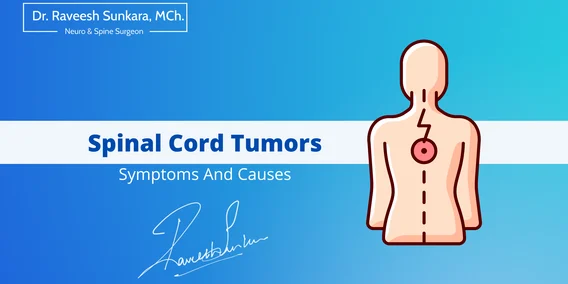A spinal cord tumor refers to an abnormal growth of mass or tissue within or around the spinal cord, spinal column, or the bones of the spine. These are primarily classified into four main types, depending upon where they occur, in relation to the protective membranes of the spinal cord and their specific position within the spine. These are:
1. Intradural-extramedullary Tumors: These tumors are mainly located inside the thin covering of the spinal cord but outside the actual spinal cord. These are mostly non-cancerous tumors but can be challenging to remove and may recur. They mainly occur at the spinal cord base, the nerve roots that extend out of the spinal cord, or the spinal cord’s arachnoid membrane.
2. Intramedullary Tumors:Typically found within the spinal cord, these tumors are often benign but can pose challenges during surgical removal. They are usually observed in the thoracic region, followed by the cervical region and the lower part of the spinal cord.
3. Extradural Tumors: These tumors are primarily in the thin covering surrounding the spinal cord. They have the potential to impact spinal cord function by causing compression and other related complications.
4. Vertebral Tumors:These tumors originate in the bones of the spine. While they frequently result from the spread of cancer from other parts of the body, such as breast or prostate cancer, primary bone tumors originating in the spine are rare but do exist.
“Understanding the potential causes of spinal cord tumors is vital for early detection and effective treatment to improve patient outcomes,” says Dr. Raveesh Sunkara, a well-known neurosurgeon in Hyderabad.
What Are The Causes?
The causes and risk factors that can create a tumor and give rise to the need for spine surgery differ for all individuals. They include:
- History of breast cancer, lung cancer, prostate cancer, ovarian cancer, or multiple myeloma.
- Leftover cell-developing cells from the embryo.
- Cell mutations in ependymal cells (cells lining the passageways where cerebrospinal fluid travels from the spine to the brain).
- Inherited medical conditions: Von Hippel-Lindau disease and Neurofibromatosis.
- Cell mutations in astrocyte cells (sub-type of glial cells).
- Cell mutation in glial cells (cells that support the nerve cells).
- Cell mutation in arachnoid mater (a membrane that lines up the spinal cord).
- Prolonged exposure to toxic chemicals in industrial settings.
- Cell mutation in nerve cells in the cervical region.
- Compromised immune systems leading to thedevelopment of lymphomas in the spinal cord.
Patients with a history of the cancers mentioned above must be vigilant about vertebral tumors and go for regular checkups.
“One must not neglect genetic causes or factors,” adds Dr. Raveesh Sunkara, who is often regarded as the top neurosurgeon in Hyderabad.“It is always advisable to get tested if there is a history of such tumors in one’s family, especially first-degree relatives.”
Are There Any Symptoms?
The symptoms of a spinal cord tumor are not very specific. Still, there are certain indications that one must be aware of. There are two types:
Symptoms specific to spinal tumors:
- Numbness, tingling in specific regions of the body.
- Pain in any specific region of the back or during specific times in the day.
- Constricting band-like pain around the chest or abdomen.
- Loss of sensation in specific regions of the body or any part of the lower body.
- Loss of balance.
- Pain like the pricking of sharp needles.
- Inability to move.
- Loss of power or weakness in arms or legs.
- Erectile dysfunction.
- Loss of urinationcontrol.
- Loss of control over defecation (passing stools).
Symptoms related to cancer as such and symptoms due to indirect pressure on the brain:
- Loss of appetite.
- Un-intended, sudden weight loss.
- Nauseous feelings, followed by vomiting.
- Excessive fever, sudden chills or shakes.
- Loss of balance.
- Untimely memory loss.
- Speech and visual difficulties.
Unfortunately, sometimes patients do not have any symptoms until the disease is at a very advanced stage. However,if any of the above symptoms exist, one must consult their doctor at the earliestbefore they become severe.
Where To Obtain Treatment?
The treatment of spinal tumors has reached remarkable advancements, guaranteeing a high level of safety. Precise surgeries employing high-powered microscopes ensure exceptional accuracy. Dr. Raveesh Sunkara uses intraoperative nerve monitoring techniques to safeguard against potential nerve damage during the surgical procedure.
Dr. Sunkara is a highly skilled neurosurgeon and specialist in spine tumor surgery. He places the well-being of his patients as a top priority and demonstrates excellent care in addressing their concerns. Renowned for his expertise in cutting-edge techniques, Dr. Sunkara is frequently called the best neurosurgeon in Hyderabad.With a successful track record, he has performed numerous spine tumor surgeries with excellent outcomes.
Are you or a loved one concerned about spine health or suspect a spinal cord tumor? Please contact us for an expert diagnosis, personalized treatment plan, and schedule surgery for a spine tumor.
Feel free to contact us even for a second opinion.







